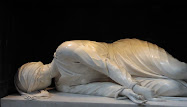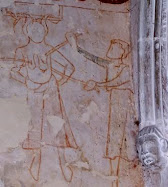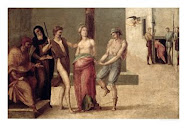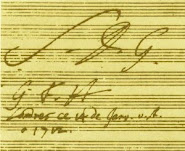NOTE: For those of you that may be new to this space, this blog started out as a way for me to process and journal through my exploration of the Traditional Catholic faith. Ultimately, it's a path I chose not to go down, but found much in my exploration that I continue to value and treasure that has changed for the better the way I engage with God in prayer and in worship. I recently had to communicate to the priest who was leading me through the catechism that I would not be returning for further instruction, nor did I have the intent to convert.
This is something I had some measure of fear to declare, knowing what his thoughts would be when he became aware of my decision. It was Terri (love her!!) who first asked me the question I had not yet asked myself: what is it that you fear from this conversation? I realized that it boiled down to being afraid of what they'd think or what would be said of me to others. Like many people, I prefer that everyone who knows me would think well of me. Writing this forced me to embrace the truth that no matter what anyone else might think, my soul is firmly in the grip of my Heavenly Father.
The letter was mailed last week.
Dear Father,
I am sorry that I missed your call the other day. I succumbed to the flu over the weekend and had little in the way of a voice that day. I hope you will forgive me for not calling back, but at present, I think it best to express myself in writing.
First of all, I wish to thank you for taking time in your instruction with me and for our conversations on the phone as well. I have learned much over the past several months and have come to hold an increasingly deep appreciation for the Catholic Church: for its historical roots, for the profound and deeply-rooted beauty of the liturgy, for learning about the lives of saints I never knew before, and for so much more. The family at Holy Redeemer is such a precious, beautiful, and generous one.
That being said, I wanted to let you know that I will not be coming back. This is not a decision I made lightly, but I am certain it is the right one. While I respect that your convictions are to the contrary, I rest securely in the knowledge that my heart and soul are safe in the hands of God.
I could launch into pages of testimony regarding all the reasons as to the whys and the hows of my decision. I could go into detail about my prayers, my tears, and the nights of heartache. But I realize that even if I wrote some fifty pages more and laid out the best constructed arguments, it would be to no profitable end for either of us. I am reasonably certain my testimony would do nothing to convince you that I am not in error, that my faith is not as one-dimensional as a cartoon drawing.
Let it be said that I came to God with open hands and after a few months of stifling and suffocating it, an open heart. What freedom came when I remembered that my heart and my intellect need not be in such opposition to one another, that I need not be caught at the center of this self-imposed tug-of-war. As Solomon wrote, I learned and am continuing to learn to trust in the Lord with all my heart and not lean on my own understanding. I am utterly content to be His child, to know this perfect Love that casts out all fear, to abandon myself to Him wholly with all that I have, to know that I can neither contain nor define Him or subject Him to any limitations. I have trusted and am continuing to trust Him to lead me and am overwhelmed by the blessings He pours out on me. I know that I am at the center of His heart, and that He is evermore in the center of mine; I am swept up in the story He is telling.
I do mean it most sincerely when I say that I am thankful for the instruction I received and for the welcome I received at the parish; I was delighted to be included in that close-knit community for a time. And so I respectfully request that you accept my decision not to join the Catholic faith. I do respect your convictions, but cannot adopt them as my own.
I want neither a terrorist spirituality that keeps me in a perpetual state of fright about being in right relationship with my heavenly Father nor a sappy spirituality that portrays God as such a benign teddy bear that there is no aberrant behavior or desire of mine that he will not condone. I want a relationship with the Abba of Jesus, who is infinitely compassionate with my brokenness and at the same time an awesome, incomprehensible, and unwieldy Mystery.
Brennan Manning, Ruthless Trust
24 January 2008
just sayin' ...
Posted by
kirsten
at
5:13 PM
17
comments
![]()
Labels: carving a path, new beginnings
18 January 2008
stuck in my head
This is one of the first songs I remember singing after returning to my home church and has long been a favorite of mine. I can't stop singing it around the house this week ...
Posted by
kirsten
at
2:29 PM
28
comments
![]()
15 January 2008
gratitude, refreshed
At last, I am emerging from the flu that has had a hold on me since Saturday. It is easier to get up and move, to stand in the shower, to make my way up the stairs. I am remembering what my home looks like from vantage points other than my couch. Today I am wearing something other than pajamas (which by all accounts have seen better days after being worn for 72 hours straight); today I washed my hair, put on mascara, made my bed. My movements are slow and deliberate, and I am grateful for the simple movement.
In a way, I am actually thankful I got sick; I am amazed at how resilient my body is and how much it has put up with over the last six months (over the past two years really, if all the gastrointestinal drama is factored in). I was overdue for a concentrated period of rest.
Though this illness spanned a mere two or three days, it felt like an eternity. My head throbbed and pounded, felt like it was going to split open like a ripe melon. Every bone in my body ached. My sinuses were staging their own protest and more than once, I was fairly certain my lungs were making an attempt to jump ship. My appetite for food had all but disappeared; every attempt to get up from the couch required that I concentrate on suppressing the overwhelming waves of nausea.
Today, I woke to a world where I could breathe through both nostrils and stand upright without visceral protest. My lungs have calmed down and it no longer feels as though someone is taking hammer and awl to my head. I just managed to enjoy a cup of steaming split pea soup. I folded laundry today and put it away, I caught up on some long-overdue ironing. Quite rightly, the sun is shining out my window. Does it get more glorious than this?
Some might express a difference of opinion, but few things give me as stark an appreciation for wellness as illness does. When accustomed to good health, it becomes easy to take it for granted, to forget what extraordinary gift is is to move, to breathe, to consume a meal. Likewise, few things make me fall to my knees with gratitude like remembering I have been set free of my chains and now reside safely in the shadow of His wing.
Posted by
kirsten
at
1:14 PM
11
comments
![]()
Labels: reflections, rest, story, wellness
13 January 2008
in medias res
I've been thinking a lot about the whole concept of story lately, both in terms of its power to move us beyond what the mere acquisition of information does, and as a way of understanding our roles in the grander scheme of all that God has planned in a very broad and eternal sense. Drilling down into the finer points of individual stories is vital; I think it could be said that the entire point of the gospel is compassion: both God's compassion toward us as manifested in the life of Christ and our compassion for other people regardless of any category or judgment we could assign them.
Compassion and story go hand in hand; unlike sympathy or even empathy, compassion means to suffer with someone (com- being a prefix meaning "with" or "together" , and the word pathos meaning "suffering"). Compassion requires the one who extends it to suffer alongside. And how are we to suffer with others unless we know the particulars of their stories: to know their wounds as we know our own, and to bear a burden of desire to relieve it? It's not a far stretch to conclude that Christ embodies this definition of suffering with in all its particulars, not only in His final and ultimate act of suffering, but also in the mundane: leaving the unimaginable splendor of heaven for the filth and stink and flesh of earth. God took on flesh and dirt under the fingernails, stomachaches and splinters, hunger and fatigue.
As someone who has only recently snapped the tether that held her heart, I can hardly be considered an authority in this regard. There is no soapbox for me to stand on or pulpit behind which I will posture myself. Perhaps it's because I'm feeling things so keenly and seeing them so freshly now that I've been blinded by the truth of it. The stone walls I hid behind are crumbled and still crumbling. As I walk through the ruins and kick these stones over, I consider how they performed a function I never consciously intended. No doubt they protected me from pain. But they also prevented me from being present for the pain of others. They walled me in, distant from joy and from full engagement in my own life. As a new friend recently stated, I was safe but ultimately unsatisfied. I was hedged in, protected against that which was bad or hurtful and also that which was good and joyful.
Relatively little is written about Christ's everyday life on earth, but I can imagine that not every day was one in which tables were turned, masses were fed from a sacklunch, or men were raised from the dead. Especially in the thirty years that preceded the advent of His active ministry, we can likely infer that there had to have been plenty of the mundane: meals around a shared table, stomachaches and headcolds, building tables and chairs, thatching rooves. Jesus came for that, too: He left heaven and emptied himself, taking on the form of a servant, subjecting Himself to our everyday -- in fact, to what is sometimes our mundane, mediocre, and quotidian existence.
It occurs to me that exercising compassion does not require that we go out of our way to seek out the person who is hurting the most, or that we attempt to insert ourselves into the stories unfolding in hospital rooms, prisons, or on the five o'clock news (though for some, it may very well include this). We are called, I believe, to come alongside those whose paths intersect with ours daily: co-workers, baristas, roommates, siblings, and spouses; to walk beside, to hold a hand, offer a shoulder, to be open arms. To listen, to ask, to laugh with. To offer what we have: an open door, a car, a shower, a bed; to get out of the way so the love of God can flow through us, inserting itself into our everydays and the everydays of those around us.
When we lock ourselves in that dragon-guarded castle, walling ourselves in as a spontaneous response to our own pain, we cut ourselves off not only from unwanted intrusions, but from love and goodness and laughter as well. We cut off the means by which we can offer ourselves to those who may be moving through the very pain we've reacted against. This is a response I know well. But now I've lowered the drawbridge, crossed the moat, and circle the stronghold I once called home. Looking away from my pile of stones, I discover a lush landscape teeming with life, a horizon that extends into eternity. This is where life is.
But as long as this remains a pretty philosophy, as long as my day-to-day interactions fail to mirror these words, they are only words hanging in space. Like the apostle Paul said:
If I speak in the tongues of men and of angels, but have not love, I am only a resounding gong or a clanging cymbal. If I have the gift of prophecy and can fathom all mysteries and all knowledge, and if I have a faith that can move mountains, but have not love, I am nothing. If I give all I possess to the poor and surrender my body to the flames, but have not love, I gain nothing.
It does not matter what I know or what I write; it does not matter if I can wow a reader or impress a publisher or have a hundred by-lines to my credit. God cares more about me serving my roommates, listening to and assisting my co-workers, celebrating with my friends in their successes and crying with them in their heartaches. In short, He wants me to be a vessel for His compassion, to be the fitting word that agrees with the story He is telling.
Our stories matter individually, but more as threads woven into the great fabric of compassion and redemption that He has been weaving since time began. Our own stories begin in medias res in relation to His own, and we have the opportunity to echo this when we walk alongside others every day. Will I be the stray thread, or will I allow myself to be inserted into the fabric of a story He began so long ago?
Posted by
kirsten
at
9:54 AM
9
comments
![]()
Labels: compassion, reflections, story
06 January 2008
inexorable trust
 I have had such deep and abiding joy since I surrendered both my heart and my mind to God over the past few weeks. In some ways it feels strange not to be in a continual state of struggle, to have prayers composed of tears and beating fists. In many of my prayers over the last several weeks and months, I have asked to be brought to a place of peace and rest. Now that I am there, it feels somewhat strange and foreign. I am by no means inactive, but I am resting. It is a sweet and blessed place to be.
I have had such deep and abiding joy since I surrendered both my heart and my mind to God over the past few weeks. In some ways it feels strange not to be in a continual state of struggle, to have prayers composed of tears and beating fists. In many of my prayers over the last several weeks and months, I have asked to be brought to a place of peace and rest. Now that I am there, it feels somewhat strange and foreign. I am by no means inactive, but I am resting. It is a sweet and blessed place to be.
I am continually in awe at how God can use whatever choices we make, whatever we offer to Him in order to mold and shape us into the fullness of who He created us to be. I have no idea whether or not He intended me to explore a traditional and ancient mode of faith, or whether that direction was one of my own choosing. But I really don't think it matters, nor do I feel a compelling or pressing need to figure it out. No matter the choice, Yahweh can bring about blessed and beautiful fruits from it.
He knew my heart was not fully His, nor was it ever fully mine. I was so selective about engaging my heart not only in my faith, but in my relationships with others and with myself as well. I can see the beginnings of my stoic tendencies back to my earliest days, denying forgiveness for playground offenses, steeling myself against the pain of childhood betrayals. When teased and taunted in middle school, I drew inward, becoming cold and numb. This carried through to high school and eventually to college where, in a moment of despair, I told a friend maybe some of us just aren't meant to be loved. It was my way of numbing myself against the pain of rejection and betrayal; what I did not realize is that I was likewise numbing myself to goodness and joy. How this must have grieved the heart of God!
There were times throughout my personal history where I allowed myself to receive and to feel, to experience both joy and grief in all their fullness. But I was so selective. My heart was on a leash and the moment I sensed the slightest risk, I called for a retreat, stuffing it quickly behind a thick and prickly armor.
As I walked through the catechism and experienced the traditional Catholic mode of worship, it appealed to that very stoic and guarded part of me. There was something that was intellectually appealing about prescribed prayers and proper forms, of calculated motions and genuflections, of consistency and historical rooting. But the more I began to intellectually assent to these things, the more stifled and distant my heart became. I felt the chasm deepen and widen; I started to feel as though I was choking.
Anyone who has followed here knows the rest of the story: how I struggled and faltered, how I cried and plead and beat my fists on the floor; how I eventually leaned away from my own understanding and threw myself heart first into the arms of Jehovah-Shalom; how in that moment of surrender I began to trust without a doubt that I have been, am now, and will be sheltered safely in His arms and in the center of His heart; how in that place of childlike abandon and utter trust, two parallel lines intersected inside me; how I returned to a church home ready to welcome me back; how my heart and I danced and still dance in worship, singing, shouting, raising hands to heaven without even a twinge of self-consciousness. My body, my voice, and my mind are responding to a faith that is heart-first. I dance like a prisoner set free of her chains, sing like someone who has long been denied her own voice. If I could, I would defy the laws of gravity and fly; and it is so very good that it does. My heart's tethers have disappeared altogether.
I would have not chosen on my own to struggle, fight, and suffer as I did, but neither would I trade any of it for what I have now. I am more His than I ever was; I am more the child as an adult than I was on the playground. I am His, and it is good, it is true, it is so indescribably beautiful.
I know the day will come when I will talk to the priest, when he will ask me why I have not returned to the parish. And I know by what he taught me that when he learns of my return to my church home, of how I will not be converting, that he will think I have fallen out of God's good graces, that I am apostate, that I will most certainly not be welcome in heaven. Even now I pray for the grace to respond in truth and with love, to explain that I belong to Yahweh; that my return to my faith home came as an act of complete and utter childlike surrender to God; that I am at the center of Jehovah's heart, and that He is at the center of mine.
Blessings and peace.
Posted by
kirsten
at
12:28 PM
8
comments
![]()
Labels: carving a path, faith, new beginnings, reflections
.jpg)








.jpg)


